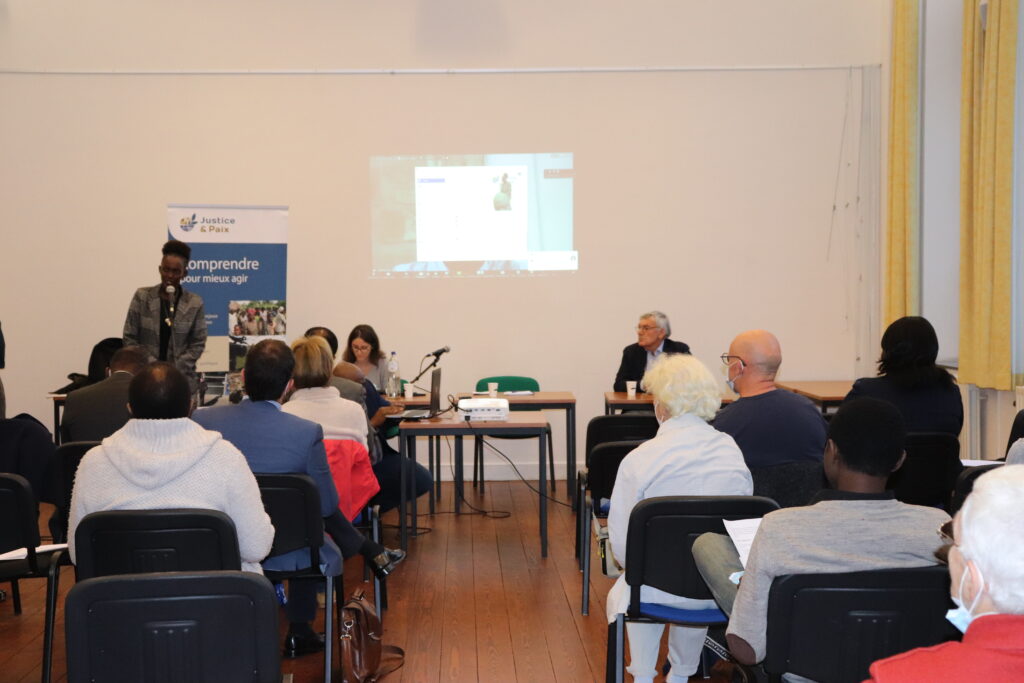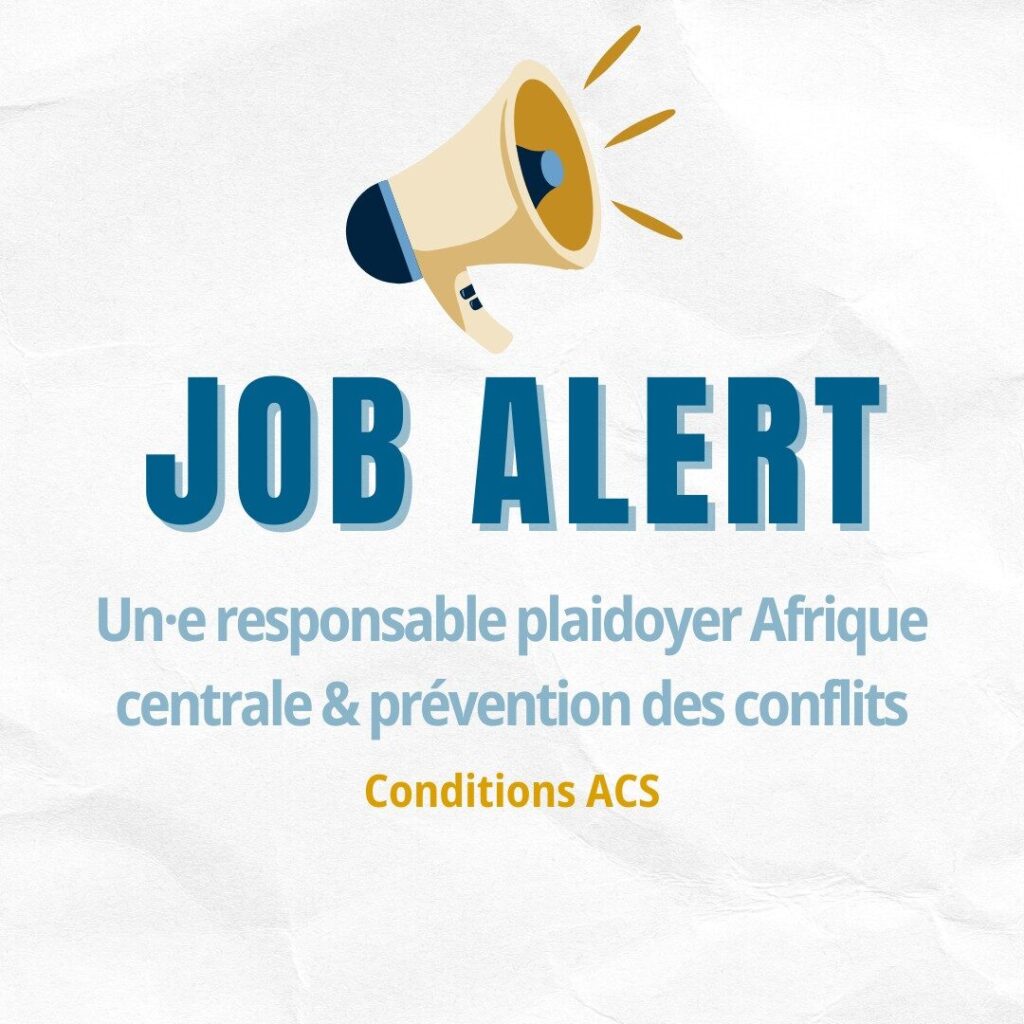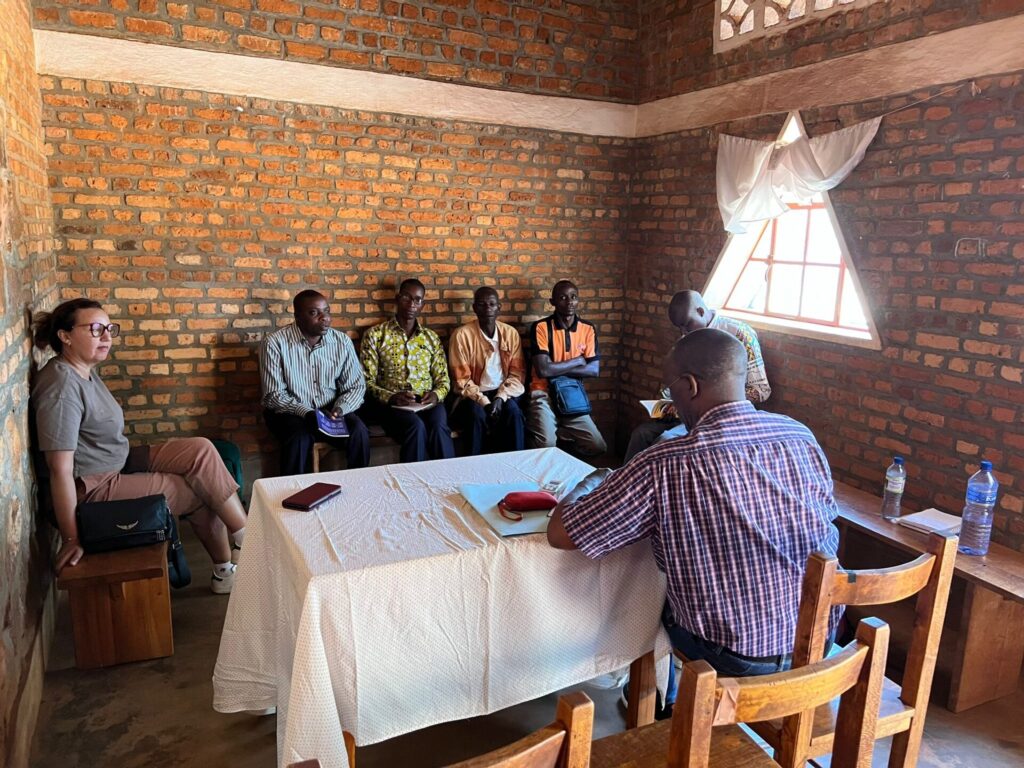Three personalities construct a point of view on the plural links between Belgium and its former colonies in Central Africa: Congo, Rwanda and Burundi. From these exchanges, of which Justice and Peace constitutes the framework, result not only the need for the work of memory aimed at historical justice, but also an affirmation of reinforced and balanced solidarity cooperation which takes into account respect for human rights.

Justice and Peace has created a space for dialogue to question relations between Belgium and the African Great Lakes States.
Sixty years after the decolonization of the African Great Lakes States, strong plural links still exist between Belgium and its former colonies (Burundi, DR Congo and Rwanda). These " special relationships» stem from the heritage of a common colonial past as well as checkered solidarity relationships.
Three perspectives arising from the speakers are developed in this text, constituting a singular exercise which does not constitute a course on colonization nor an evaluation of diplomatic relations or even that of the impact of official development assistance (ODA). These shared perspectives allow us to establish a framework for dialogue towards the construction of future relationships, informed by the historical past and based on trust and respect. This approach was summarized by Professor Sentamba Elias: “it is necessary to analyze the facts as objectively as possible, showing empathy and trying to think about the interests of future generations (…)”[1].
A necessary examination of the past : memory work
Colonization must be commonly understood as a process of forcible appropriation of a territory and its inhabitants, based on systemic racism.[2]. Professor Elias Sentamba reminds us that the actions of Leopoldian and then Belgian colonization, in the African Great Lakes region, must be understood in at least three dimensions: cultural, political and economic. First, we must underline the weakening of traditional African cultures in favor of Western culture, imposed by the colonist. Then, at the political level, it should be noted that the Belgian presence considerably weakened royal authority, reorganized power around the colonial administration and established a new judicial system. From a socio-political point of view, it is also necessary to note that the Belgian colonial power participated fully in ethnicization[3]of current Burundian and Rwandan societies (Ruanda-Urundi under Belgian mandate following the dissolution of the German colonial Empire). Finally, at the economic level, the professor particularly highlights the exploitation of rubber during the Leopoldian era and the introduction of a new capitalist paradigm accompanied by great violence.
A citizen consensus seems to be emerging around the idea that we must be able to look the truth in the face, leave aside the ideas emanating from Belgian colonial propaganda (for example, that of a civilizing mission) and only speak in terms of knowledge. established, on which a broad consensus is reached[4]. It is a question of truth and historical justice. Here, it seems relevant to recall that, for a majority of diasporas from former Belgian colonies, the notion of recognition is essential. They fully demand the in-depth teaching of colonial history at school. Such a claim is justified in particular through the issue of historical justice, but also of social cohesion and inclusion in Belgium. Indeed, understanding and recalling Belgian colonial history leads us to question the fact that Afro-descendants are perceived as non-nationals.[5]
Today, the construction of a common and serene future must imperatively involve a frank examination of the past. There would be no doubt that the harms caused by colonization such as domination, enslavement, crimes, destruction of African cultures and violence continue to be ignored.
What are the ways to analyze the past?
Cet avenir ne peut être que co-construit par les différents protagonistes. Il est nécessaire d’éviter certains écueils dans le processus. C’est ce que nous rappelle Johan Swinnen, ancien ambassadeur de la Belgique dans la région. Il s’agit notamment d’éviter l’anachronisme visant à analyser le passé avec un regard déconnecté des réalités temporelles ou de juger les faits historiques au regard des normes et valeurs actuelles au risque de vite approuver ou de disculper les faits. Il recommande donc de contextualiser.
Let us emphasize, however, that each historian questions the past according to the questions that the present poses to him, that is to say that contemporary concerns also come into play in the analysis.[6]
This being said, we know that at the time of Leopoldian colonization, both national and international criticism was already being raised, more particularly against the atrocities linked to the cultivation of rubber. In this respect, we find, for example, the satire “ King Leopold's Soliloquy »by Mark Twain which denounces the exploitation of the Congo by the sovereign, although it is a work of fiction. Several pamphlets were also published, notably by British missionaries. The photographs taken by Alice Seeley Harris are also part of this wave of denunciation (see Congo Reform Association). Later, anti-colonial movements would also criticize Belgium's late withdrawal. At the time, the presence of foreign powers in Africa was already disapproved by many international protagonists.
The honorary diplomat also stressed the importance of not “creating a diversion”. It would be counterproductive, according to him, to blame Belgium for all the current ills that still plague Burundi, Rwanda and the DR Congo.
Let us remember that measuring the impact of colonization on the current situation and/or socio-political dysfunction in Central Africa is a perilous exercise. Furthermore, wondering where the African Great Lakes region would be today if colonization had not taken place is uchrony, or the creation of an “alternative history”. One would be tempted to think that the other African regions which were also colonized are doing better or would be more prosperous with less violence than the three states in question. However, let us insist on the fact that each current socio-political situation is unique and complex. Each case is the result of the coincidences of history and political decisions.
On the question of Belgian responsibility in the current political situation, sixty years later, the diaspora has divided opinions. Many still say they have no opinion, although Afrodescendants generally embrace the idea that Belgium is still responsible for the current political situation.[7] Whatever the case, it is possible, at the same time, to question the consequences of colonization on current regimes and to act on them to promote Human Rights. Current politicians and leaders should also be held accountable.
An honest examination of the past remains necessary so that current generations, who did not experience the colonial era, cannot be held responsible for it nor are led to build their future relationships on the basis of colonial representations. According to Johan Swinnen, strict and informed discernment of the past can “free up energy for new and mature relationships”[8].
Let's look towards tomorrow : future prospects
Professor Sentamba insists on the importance of dialogue and calls on current generations of Belgian and African leaders to come to the discussion table to resolve the disputes linked to colonization.
According to him, the question of reparation is symbolic. Indeed, how could Belgium repair its wrongs in Burundi, DR Congo and Rwanda? Professor Sentamba suggests using the repertoire of images and memory, for example apologies or the construction of infrastructure such as a hospital in memory of the victims of a particular event. The notion of symbol is also important, because we cannot redeem lost lives or repair past suffering by building schools or hospitals. The idea is not to try to compensate for physical violence, but to take symbolic actions while remembering that the past cannot be completely repaired[9].
Necessary quality international solidarity
At the level of development cooperation, the journalist François Ryckmans, through the wealth of his field work and his numerous experiences, was able to give blatant examples of the damage caused by development aid or humanitarian aid when these these are only dictated by issues from the “North”. According to him, all donors, whether States or other international actors, must operate in support of partners who best know the issues on the ground. This is one of the alternatives to the recurring criticisms of development cooperation which must highlight the diversity of local know-how.
To go further in quantitative and qualitative terms, although Belgian development aid has increased (in volume and as a percentage relative to gross national income), in 2020, it does not yet reach the threshold of 0.7% at which the Belgium joined in 1970[10]. The quality of Belgian aid is supposed to respect several criteria, notably alignment, ownership and coherence. It must align with the needs, objectives and interests of partners and local populations. It must also take care to make maximum use of the tools (such as management and monitoring systems) of partner countries, with the aim of strengthening capacities and ensuring the sustainability of the actions put in place. These indicators are not always very stable and have even been reduced in recent years[11]. Consequently, it is necessary for Belgian government cooperation to ensure that partners are included from the creation to the implementation of development programs.
Aid cannot be universal (“one-size-fits-all”[12]). However, there are cases where development programs rely on solutions thought out in advance and fail to innovate in the face of specific and particular problems. If we take the case of Burundi, we notice that development programs have tended to neglect local problems linked to security[13]. Furthermore, they do not always take into account the fragility of partner States. For example, for the Burundian public administration, the creation of a sector specific to HIV/AIDS represented a burden which had consequences on the effectiveness of programs.[14].
Respect for human rights
Beyond differences of views, respect for human rights required unanimity. This is the common horizon towards which to move in order to build healthy diplomatic relations. Far from paternalism, it is precisely about mature, fair and balanced relations, from State to State. This therefore implies that each country can be responsible for respecting human rights. Thus, we will cite, as an example, the criticism of the Congolese president, regarding the student who was refused entry into Belgium even though he had a valid visa.[15], or that of Belgian Foreign Affairs, on the subject of the right of defense in the Rusesabagina affair[16]. The non-respect of human rights and democratic principles notably led to the breakdown of relations with Burundi in 2015. What is to be deplored in the case of economic sanctions, however, is that local populations are the first to suffer. .
What actions for harmonious relationships?
Justice and Peace is aimed at anyone who wishes understand to act better!
Thus, it offers a space for citizen engagement in favor of human rights, social justice, peace and environmental protection. If we want to build a better future anchored in mutual respect, we must ensure we learn lessons from the common past that Belgium shares in a particular way with this region of the world. Maintaining a dialogue, obtaining information and discussing remain essential steps. Educating yourself and collectively recognizing shared history is essential. Belgian citizens from all backgrounds will benefit from living in a society where tolerance reigns and benefits everyone. The problems of discrimination of which Afro-descendants are still victims must also concern Belgian citizens, because living together is everyone's business.
Each citizen cannot participate in the construction of a more inclusive society by becoming aware of the manifestations of institutional and structural racism whose traces still color our society.
Participating in dialogue, committing to supporting organizations that promote social justice or even challenging decision-makers, whether local, regional or national, is certainly useful. Finally, to participate in the construction of a fairer and more humane society, citizens can campaign for links of international solidarity respecting Belgium's commitments, both qualitative and quantitative.
France Hubert.
Bibliography
AFP in The evening, September 20, 2021. https://www.lesoir.be/395901/article/2021-09-20/paul-rusesabagina-condamne-25-ans-de-prison-pour-terrorisme-sophie-wilmes
Belga in Free Africa, October 4, 2021. https://afrique.lalibre.be/64168/belgique-expulsion-avortee-pour-un-etudiant-congolais-inscription-a-luclouvain/
Cailhol, Johann et al., “A decade of aid coordination in post-conflict Burundi’s health sector”, Globalization and Health, vol.15, n°25, 2019, pp.1-14
CNCD, 2021 report on Belgian development aid. Cooperate for post-Covid reconstruction. Brussels, 2021, 74p.
Demart, Sarah et al., Citizens with African roots: a portrait of Belgian-Congolese, Belgian-Rwandan and Belgian-Burundians. King Baudoin Foundation. November 2017, 223p.
Desrosiers, Marie-Eve & Muringa, Gérard. “Effectiveness under fragile conditions?: sociopolitical challenges to aid and development cooperation in Burundi”, Conflict, Security & Development, vol.12, n°5, 2012, pp.501-536
Lauro, Amandine & Henriet, Benoît. “Ten preconceived ideas about Belgian colonization”, carte blanche in The evening, March 8, 2019. https://www.lesoir.be/211032/article/2019-03-08/carte-blanche-dix-idees-recues-sur-la-colonisation-belge
[1] Conference on October 4, 2021.
[2] Lauro, Amandine & Henriet, Benoît. “Ten preconceived ideas about Belgian colonization”, carte blanche in THE Evening, March 8, 2019. https://www.lesoir.be/211032/article/2019-03-08/carte-blanche-dix-idees-recues-sur-la-colonisation-belge
[3] Ethnicization is a process creating categories assigned on the basis of membership in a group, supposed or proven, according to physical and/or cultural criteria. Colonial administrations restructured societies according to ethnic criteria by essentializing them where before, they were flexible.
[4] Lauro, Amandine & Henriet, Benoît, Location cit.
[5] Demart, Sarah et al., Citizens with African roots: a portrait of Belgian-Congolese, Belgian-Rwandan and Belgian-Burundians. King Baudoin Foundation. November 2017, p.174
[6] Dialogue carried out with Saur, Léon. CJP, February 10, 2021
[7] Demart, Sarah et al., op. cit., p.165
[8] Conference October 4, 2021
[9] https://www.justicepaix.be/de-la-necessite-de-penser-le-passe-colonial-belge-en-afrique-centrale/
[10] CNCD, 2021 report on Belgian development aid. Cooperate for post-Covid reconstruction. Brussels, 2021, p. 19
[11] Ibid ,p.32
[12] Literally: one size fits all
[13] Desrosiers, Marie-Eve & Muringa, Gérard. “Effectiveness under fragile conditions?: sociopolitical challenges to aid and development cooperation in Burundi”, Conflict, Security & Development, vol.12, n°5, 2012, p. 515
[14] Cailhol, Johann et al., “A decade of aid coordination in post-conflict Burundi’s health sector”, Globalization and Health, vol.15, n°25, 2019, p.12
[15]Belga in La Libre Afrique, October 4, 2021. https://afrique.lalibre.be/64168/belgique-expulsion-avortee-pour-un-etudiant-congolais-inscription-a-luclouvain/
[16] AFP in Le Soir, September 20, 2021. https://www.lesoir.be/395901/article/2021-09-20/paul-rusesabagina-condamne-25-ans-de-prison-pour-terrorisme-sophie-wilmes





